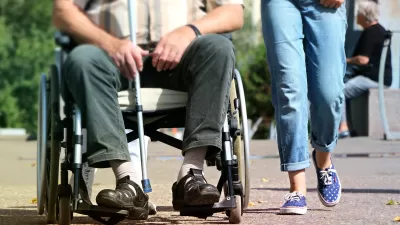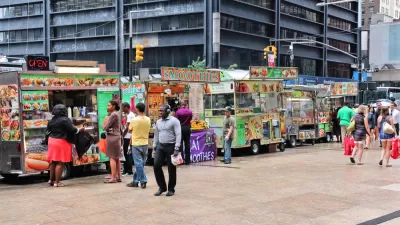In the 1950s, nearly 1/5 of Americans moved each year. That trend is quickly reversing. Americans are now staying put in greater numbers than at any time since World War II, and experts have plenty of opinions on why that is.
From the recession and lack of jobs to a new sense of community ties and rootedness, Americans are choosing to stay put and delay moving for a wide variety of reasons. A panel of experts including urbanist Richard Florida, economist Lawrence Katz, sociologist Katherine Newman, and demographer Peter Francese weighs in on what's tying Americans down, whether or not it will last, and what it all means for communities.
From Richard Florida: "One consequence of this is a new kind of class divide in America between the 'mobile' who have the resources and flexibility to pursue economic opportunity and the 'stuck' who are tied to places with weaker economies or where their personal economic prospects are more limited."
Thanks to Rebecca Sanborn Stone
FULL STORY: A Nation of Hunkered-Down Homebodies

Planetizen Federal Action Tracker
A weekly monitor of how Trump’s orders and actions are impacting planners and planning in America.

Map: Where Senate Republicans Want to Sell Your Public Lands
For public land advocates, the Senate Republicans’ proposal to sell millions of acres of public land in the West is “the biggest fight of their careers.”

Restaurant Patios Were a Pandemic Win — Why Were They so Hard to Keep?
Social distancing requirements and changes in travel patterns prompted cities to pilot new uses for street and sidewalk space. Then it got complicated.

Platform Pilsner: Vancouver Transit Agency Releases... a Beer?
TransLink will receive a portion of every sale of the four-pack.

Toronto Weighs Cheaper Transit, Parking Hikes for Major Events
Special event rates would take effect during large festivals, sports games and concerts to ‘discourage driving, manage congestion and free up space for transit.”

Berlin to Consider Car-Free Zone Larger Than Manhattan
The area bound by the 22-mile Ringbahn would still allow 12 uses of a private automobile per year per person, and several other exemptions.
Urban Design for Planners 1: Software Tools
This six-course series explores essential urban design concepts using open source software and equips planners with the tools they need to participate fully in the urban design process.
Planning for Universal Design
Learn the tools for implementing Universal Design in planning regulations.
Heyer Gruel & Associates PA
JM Goldson LLC
Custer County Colorado
City of Camden Redevelopment Agency
City of Astoria
Transportation Research & Education Center (TREC) at Portland State University
Camden Redevelopment Agency
City of Claremont
Municipality of Princeton (NJ)





























